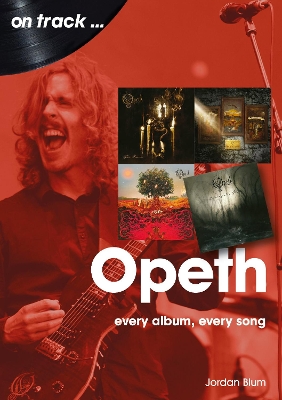On Track
3 total works
It's nearly impossible to discuss the history of rock music without praising the monumental quality, impact, variety, and boldness of Britain's Jethro Tull. Named after an eighteenth-century agriculturalist - and not after their striking frontman Ian Anderson - the group almost immediately became one of the most ambitious, and significant acts in two subsections of the genre: progressive rock and folk rock. Officially formed in 1967, mastermind Anderson and company initially forged a blues course before veering in a more diverse, and expansive direction. Their early 1970s period - which is often considered their peak-took them close to progressive rock via iconic album cuts like `Aqualung' and lengthy narrative suites like Thick as a Brick and A Passion Play.
Moving album by album, this book will examine the behind-the-scenes circumstances and motivations for each release via a track-by-track analysis to acutely observe why Jethro Tull were - and always will be - of invaluable benefit to rock music.
Moving album by album, this book will examine the behind-the-scenes circumstances and motivations for each release via a track-by-track analysis to acutely observe why Jethro Tull were - and always will be - of invaluable benefit to rock music.
No other band has affected modern progressive metal as deeply or widely as American quintet Dream Theater. Formed at Berklee College of Music) as Majesty in 1985 by guitarist John Petrucci, drummer Mike Portnoy, and bassist John Myung, the group has spent thirty years repeatedly pushing new boundaries and reinventing their identity. Although other acts - such as Queensryche and Fates Warning - paved the way for the prog-metal subgenre, Dream Theater were without doubt the first to meld influences from both metal and progressive rock into a groundbreaking blend of quirky instrumentation, extensively complex arrangements, and exceptional songwriting. Whether subtly or overtly, they've since left their mark on just about every progressive metal band that's followed.
In this book, Jordan Blum examines virtually all Dream Theater collections, and their behind-the-scenes circumstances, to explore how the group distinctively impacted the genre with each release. Whether classics of the 1990s like Images and Words and Metropolis Pt. 2: Scenes from a Memory, benchmarks of the 2000s like Six Degrees of Inner Turbulence and Octavarium, or even thrilling modern efforts like A Dramatic Turn of Events and Distance Over Time, every sequence of albums contributes something crucial to making Dream Theater's legacy nothing short of astonishing.
In this book, Jordan Blum examines virtually all Dream Theater collections, and their behind-the-scenes circumstances, to explore how the group distinctively impacted the genre with each release. Whether classics of the 1990s like Images and Words and Metropolis Pt. 2: Scenes from a Memory, benchmarks of the 2000s like Six Degrees of Inner Turbulence and Octavarium, or even thrilling modern efforts like A Dramatic Turn of Events and Distance Over Time, every sequence of albums contributes something crucial to making Dream Theater's legacy nothing short of astonishing.
A 'cult' band with a mass following, the band's last five albums have made the top 30 in the UK. Still active, recording and touring. Completely unique - no other band mixes progressive rock, metal and jazz in the same way.
There has never been - and never will be - another band like Opeth. Formed in Stockholm, Sweden circa 1989, their roughly thirty-year career showcases a melding of diverse influences; a prevailing commitment to songwriting and instrumental excellence; and unwaveringly chameleonic vision - no matter the cost - that's unmatched by any of their stylistic peers. Be it their most unashamedly brutal early LPs, their multifaceted and near-faultless mid-period opuses, or their somewhat polarizing recent glimpses into macabre 1970s-esque prog/jazz rock eccentricity, mastermind Mikael Akerfeldt and company continuously create records that push themselves, their audience, and progressive music as a whole, forward. The result is easily among the most extraordinary, dependable, and laudable legacies in modern metal.
Using a meticulously crafted mixture of original analysis and behind-the-scenes research, this book digs into all facets of Opeth's output to discover how they innovated and evolved with practically every release. After all, each 'observation' - from their 1990s black metal classics (Morningrise and My Arms, Your Hearse) and 2000s progressive death metal masterpieces (Blackwater Park and Ghost Reveries) to their stunning progressive rock/jazz fusion excursions of the 2010s (Pale Communion and In Cauda Venenum) - found Opeth ceaselessly harvesting a one-of-a-kind catalogue that's still remarkably influential and impressive
There has never been - and never will be - another band like Opeth. Formed in Stockholm, Sweden circa 1989, their roughly thirty-year career showcases a melding of diverse influences; a prevailing commitment to songwriting and instrumental excellence; and unwaveringly chameleonic vision - no matter the cost - that's unmatched by any of their stylistic peers. Be it their most unashamedly brutal early LPs, their multifaceted and near-faultless mid-period opuses, or their somewhat polarizing recent glimpses into macabre 1970s-esque prog/jazz rock eccentricity, mastermind Mikael Akerfeldt and company continuously create records that push themselves, their audience, and progressive music as a whole, forward. The result is easily among the most extraordinary, dependable, and laudable legacies in modern metal.
Using a meticulously crafted mixture of original analysis and behind-the-scenes research, this book digs into all facets of Opeth's output to discover how they innovated and evolved with practically every release. After all, each 'observation' - from their 1990s black metal classics (Morningrise and My Arms, Your Hearse) and 2000s progressive death metal masterpieces (Blackwater Park and Ghost Reveries) to their stunning progressive rock/jazz fusion excursions of the 2010s (Pale Communion and In Cauda Venenum) - found Opeth ceaselessly harvesting a one-of-a-kind catalogue that's still remarkably influential and impressive


